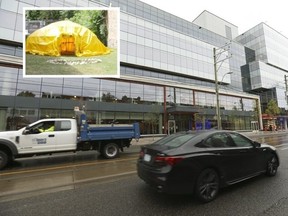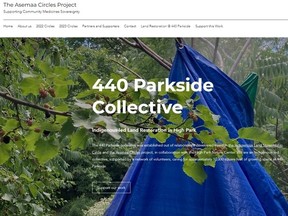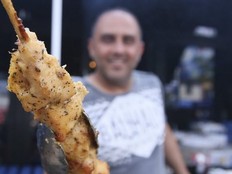Beads, firewood, food part of Toronto’s $219,500 'climate action' spend

Article content
The city spent almost a quarter-million dollars last year to fight climate change with things like dream catchers, beadwork and cooking classes.
City hall approved $219,500 worth of grants in 2023, the first year of Toronto’s Indigenous climate action grants program, according to documents obtained by the Sun via a freedom-of-information request.
The documents show the program blew past the $200,000 budgeted by the city’s environment and climate division by nearly 10%.
The program offers grants of up to $20,000 “to support local Indigenous communities in undertaking projects and initiatives that help to address the climate emergency and protect the environment,” according to a city news release from when the initiative was announced in June 2023. (Unlike this program, city hall publicly announces the recipients of similar but smaller grants meant for youth and neighbourhood groups.)
There were two rounds of approvals: One for projects submitted by a July 2023 deadline and one for a September 2023 deadline. The city said 18 of 25 eligible proposals last year were approved and funded.
Some proposals centre on educational initiatives, such as Children’s Peace Theatre, which was granted $15,000 to fund programming on subjects such as ecological governance and biodiversity.
A group called Earth Works Visions was awarded $17,000 to host stewardship events on a trail that runs along the Humber River in Weston. The Turtle Protectors were given $15,000 to pay for a part-time staffer and honorariums for volunteers.
In a written response to questions from the Sun, city officials said the grants are “directly aligned” with Toronto’s council-approved carbon-emission goals.
Many proposals, however, lack a clear link to the environment, let alone the climate.
Two groups, Afro-N8tive Creations and the Afro-Indigenous Nova Scotian Collective, were each given $7,500. The former wanted the money to “showcase their art, traditional medicines and environmentally focused crafts while supporting the Black and Indigenous community,” a document from the environment and climate department showed. The other had plans for “cultural teachings, such as ribbon skirt making, beading and a dream catcher workshop,” and to hold a feast. (A Facebook account linked to the Afro-Indigenous Nova Scotian Collective’s website has no posts after Sept. 24, 2023. It was approved as part of the round of proposals submitted by Sept. 15.)
Deeply Rooted Farmers Market, which billed itself on Instagram as “Tkaronto’s first Black and Indigenous farmers market,” was given $10,000 to develop “culturally relevant workshops for community members, including beadwork and cooking classes.” (The group’s website is offline and its social media pages have not been updated since 2023. The city confirmed it no longer has a permit for the East York park where it once operated.)
Asemaa Circles got $15,000 to create “a BIPOC seed and medicine sharing and trading network.” CAMH’s Shkaabe Makwa group was awarded $7,500 for gardening supplies, “traditional medicines,” firewood and costs related to the centre’s sweat lodge.

Waadinidijig, a “virtual study group” of Ojibwa students, was granted $5,000 to support “Immersion Days programming” and a “medicine planting workshop.” The Call Auntie Clinic got $14,000 to “make walking and mobility more accessible, as well as increasing outdoor time with infants and children,” plus preparing “traditional meals.”
A group called MichiSaagiig Jiimaaneg was granted $17,000 for a teaching lodge – “a space to observe nature and learn about using renewable resources” – on Toronto Island.
“Due to legislation and inherent racism by settlers, the Mississauga of the Credit and other Mississauga nations have not been able to access Toronto Island for many generations now. Having a lodge that is engaged in Mississauga culture and knowledges is necessary for the well-being of our nation,” the proposal said.
The Indigenous Land Stewardship Circle was awarded $17,000 for four ceremonies: For the spring and autumn equinox and summer and winter solstice, plus “full moon” rituals and water blessings.

Then there is the case of a “group” called 440 Parkside Dr. The city set aside $10,000 for the High Park land reclamation initiative, which Asemaa Circles’ website said “was established out of relationships developed through the Indigenous Land Stewardship Circle and the Asemaa Circles project, in collaboration with the High Park Nature Centre.”
While this additional funding could have put these groups over the $20,000 maximum, the city said in its statement that the grants are awarded on a “project basis.”
This sort of collaboration by Indigenous groups is “very common and, in fact, encouraged,” the statement added.
CAMH also provided a statement to the Sun. It said allowing patients to connect with the land “through ceremony, access to traditional medicines and cultural teaching is critical to (its) innovative model of care,” but offered no comment as to how traditional healing initiatives better the environment.
In all cases for which contact information was available online, the Sun reached out to the groups whose projects appeared unrelated to the environment. Only CAMH responded.
RECOMMENDED VIDEO
In its statement, the city said “many” of the climate action grant projects “directly support climate resilience.
“Healthy green and blue spaces offer multiple climate benefits in urban environments,” the statement said, and “cultivating and growing Indigenous knowledge and learnings will provide information about how to best steward Toronto’s natural spaces and biodiversity.”
Additionally, “people who are socially isolated or disconnected from their communities are more at risk from climate impacts,” the city said.
The city said the grants came with “reporting requirements” that included visits from a municipal employee. In the case of Deeply Rooted Farmers Market, the proposed programming was completed last year while it was still running, the city said.
Last year’s results seem to have inspired city hall to relax its grip on the money. Group members no longer need to live in separate households to qualify for funding and larger grants are available for groups that have neither a trustee nor “a bank account in the name of the collective,” the statement said.
The final deadline for 2024 applications was Sept. 20. Those applications are still under review.














Postmedia is committed to maintaining a lively but civil forum for discussion. Please keep comments relevant and respectful. Comments may take up to an hour to appear on the site. You will receive an email if there is a reply to your comment, an update to a thread you follow or if a user you follow comments. Visit our Community Guidelines for more information.